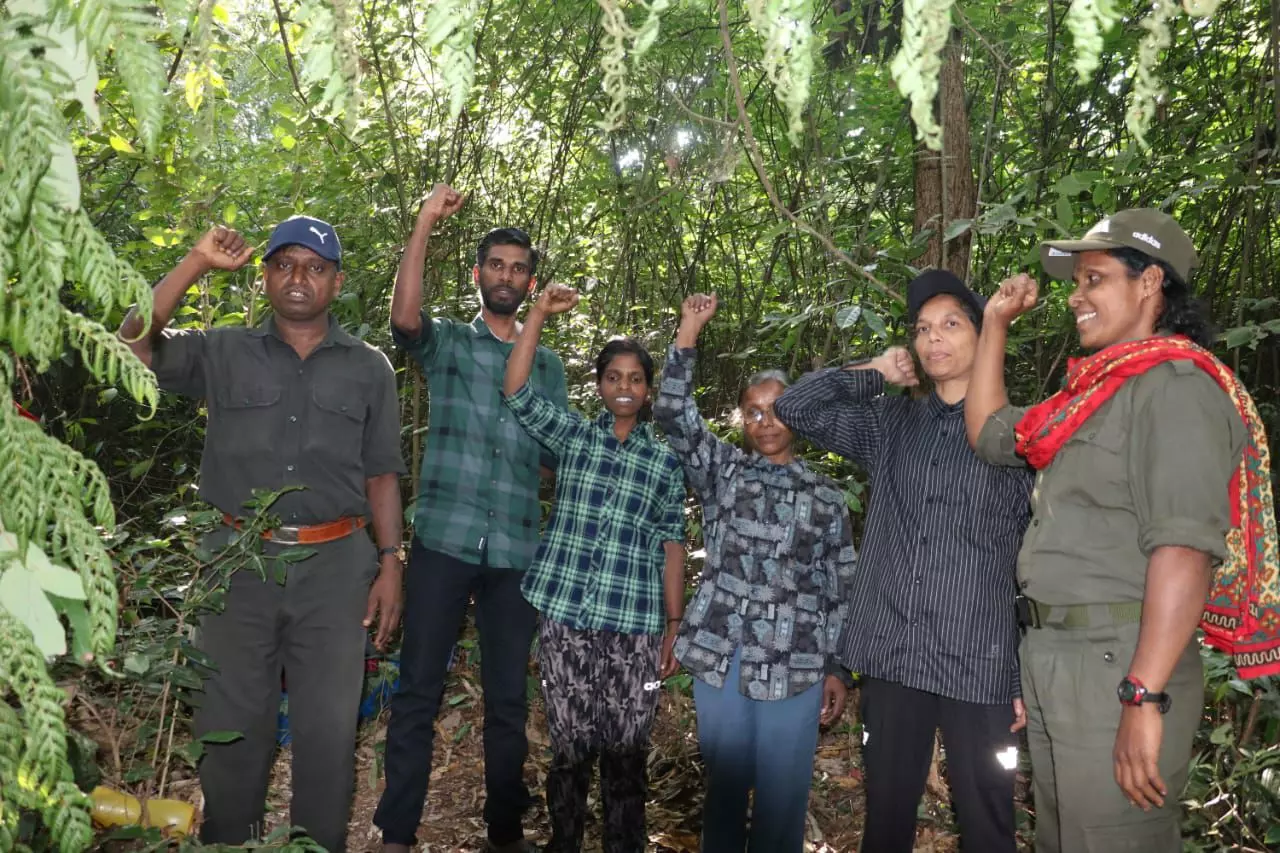
(From left) Jayana, Vasanth, Jisha, Vanajakshi, Sundari and Mundagaru Latha
Six Naxalites, including four women, surrender in Karnataka
The surrender comes after extensive discussions involving the government, addressing issues like legal proceedings over pending cases and rehabilitation

Six Naxalites, including four women, on Wednesday (January 8) surrendered in Karnataka after years of underground work in Karnataka, Kerala, and Andhra Pradesh.
The surrender took place at the District Commissioner's office at Chikkamagaluru. Three of them were women from poor and impoverished families who took to the gun after failing to fight powerful vested interests in the rural areas where they lived.
Mundagāru Latha
One of the Maoists is Mundagaru Latha, who was originally from Bukadibail in Koppa taluk. Also known as Lokamma alias Shyamala, she embraced Maoism around 2000 at age 18.
Hailing from a poor tribal family, she was reportedly compelled to abandon her education in the 6th grade due to poverty and harassment. The threat of losing her home due to the Kudremukh National Park project led her wield arms in the Malnad region.
Other tribal women
Another is Sundari Kutloor, also a tribal woman from Kutloor in Belthangady in Dakshina Kannada district. Sundari left school in the 3rd grade due to poverty.
Her family faced displacement threats from the Kudremukh National Park project. In 2004, at age 19, she joined the Maoists, operating in Kerala and Karnataka, driven by police raids and harassment against her community.
Ex-Gram Panchayat member
The third Naxalite woman was Vanajakshi Balehole, who hails from Balehole village in Kalasa taluk in Chikkamagaluru. A tribal woman, she was educated up to SSLC (10th grade).
She was elected unopposed as a Gram Panchayat member in 1992 and 1997. Despite her political involvement, she struggled to protect her small piece of land from powerful individuals. Personal tragedies and exploitation of her community led her to lose faith in the system and join the armed struggle.
Also Read: 2024, a year when the world went adrift amid war, mass killings
A BTech graduate
K Vasanth alias Vasanth is the only Tamil in the group. Hailing from Arcot in Vellore (Tamil Nadu), he is a BTech graduate who was influenced by social concerns. After completing his degree in 2010, he joined the Maoists and was active in Kerala-Karnataka region.
Jayanna alias Mareppal is a resident of Aroli village in Manvi taluk of Raichur district. He joined the Naxalite movement after seeing the oppression of the poor. A Dalit, it was while pursuing a BA degree that he was drawn to the Maoist movement.
In 2000, at age 24, he became a Naxalite. Since then, he took part in struggles in the Kerala-Karnataka region. He has decided to allocate half of the compensation he gets under a government rehabilitation package to develop a village school.
A Kerala Naxalite
The sixth Naxalite to surrender is TN Jisha, an Adivasi woman from Makkimala in Wayanad district in Kerala. Having studied up to Class 8, Jisha joined the Naxalites in Kerala in 2018. In 2023, she moved to Karnataka and took part in struggles in the state's coastal region.
The surrender event is part of Karnataka's initiative to become Naxalite-free.
The surrender initiative
The surrender was facilitated by the Naxal Surrender and Rehabilitation Committee led by Dr. Banajagere Jayaprakash, lawyer KP Sripal and journalist Parvatheesh Bilidale.
Their surrender followed extensive discussions between the Naxalites and the government, addressing issues such as rapid legal proceedings over pending cases, rehabilitation packages, and the right to engage in civil activism.
Karnataka Chief Minister Siddaramaiah endorsed the surrender initiative, emphasizing the state's commitment to reintegrating Naxalites into mainstream society.
Role of civil society
The Karnataka government, in collaboration with civil society groups, has been facilitating the surrender process.
Also Read: Sambhal violence: As hate is normalised, we as a nation need to feel again
The government is also addressing demands to end alleged harassment by the forest department, providing land for tribal communities, and ensuring housing for Dalits.
Home minister G Parameshwara drew parallels with earlier efforts under SM Krishna was the chief minister.
